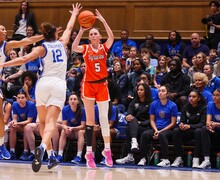Buzz Shaw provides insight on chancellor’s transition
CORRECTION: In a previous version of this article, the day Chancellor Nancy Cantor announced she would step down was misstated. Cantor made the announcement Friday. The Daily Orange regrets this error.
It was difficult for former chancellor Kenneth “Buzz” Shaw to pick the right time to announce his retirement. Ultimately, he decided the date rested on one thing: basketball.
He originally planned to announce his retirement in April of 2003, but chose to wait to avoid conflicting with the men’s basketball team’s advance to the NCAA Final Four.
The decision of timing is one that weighs heavily in a chancellor’s decision of when to announce that he or she will step down. On Friday, current chancellor Nancy Cantor announced she would step down on the heels of reaching the billion-dollar fundraising goal of The Campaign for Syracuse University.
Shaw, who served as SU’s chancellor from 1991-2004, said he was happy he delayed his announcement because the tournament was “more important in the scheme of things” for SU.
“It wasn’t as if one day I woke up and said, ‘Oh it’s time to go,’” Shaw said. “I had been chancellor for 13 years and felt comfortable that I had plenty left in my tank, but there were things that I wanted to do and it was probably time.”
Shaw said he has not spoken to Cantor since she made her announcement to the community and he does not plan to give her advice, due to the personal nature of the subject.
The decisions of when to retire and to announce his retirement involved long discussions with the chairman of the board, Shaw said.
Before leaving, Shaw said he did have a number of small goals. During his last two semesters, Shaw asked faculty leadership and his cabinet to advise him on what initiatives were essential to accomplish.
“The idea, although it is almost impossible to do this, was to try and leave the cleanest slate you can,” he said. “And also to not make changes during that time that would interfere with what the new chancellor would want to do.”
Although he couldn’t remember the specifics of the different initiatives, Shaw said it mostly consisted of university budget issues and other administrative obligations.
“They weren’t huge things like ‘Let’s create a new college,’” Shaw said. “They were things of relatively minor importance — things that would be good to get done so the new chancellor could concentrate on more global issues.”
After his announcement in spring of 2003, Shaw said he didn’t notice any “diminution of activity” in the University Senate or in his staff.
But, during the beginning of his last semester at SU, Shaw said he did notice that his staff was eager to accomplish his remaining goals.
“But they were kind of mentally moving on,” Shaw said. “There’s a lot of stress associated with a chancellor or a president leaving, and while it might be difficult on the president and chancellor, it’s very difficult on the staff.”
By 2004’s commencement, Shaw said people slowly began to disengage, even though he was still technically chancellor. He said he found this to be understandable because Cantor needed time get to know the staff and “get the lay of the land.”
During the 2003-2004 academic year, Shaw said he did not want to be involved with the search for the new chancellor.
The governing board, which consists of the Board of Trustees at SU, is the entity that has the “fiduciary responsibility for the institution,” and is in charge of finding the new chancellor, Shaw said.
A search committee is established, Shaw said, which typically consists of faculty, staff, students, trustees, alumni and the chairman of the board. Because of SU’s size, a consultant is hired to find potential candidates. The board then receives the committee’s recommendations and they move forward with the hiring process.
When stepping down as chancellor, Shaw said, there is no guarantee that the initiatives established will remain a part of SU’s tradition.
Some of Shaw’s most influential initiatives were pushing SU to have an emphasis on research and creating the $5-million fundraising initiative to endow Remembrance Scholarships.
“Once you step down, you have to understand that no matter how good you think the things you put together were, you’re not guaranteed that they’ll stay the same,” Shaw said. “You have to accept that. If you don’t step down ever, you eventually die and it happens anyway.”
During his chancellorship, Shaw said he attempted to build a culture of mutual respect, engage people in the decision-making process at SU and create a clear line of who makes decisions.
Shaw said he never had doubts about his decision to leave SU and knew that the timing was right.
“It felt good. It felt very good,” he said. “I felt I was leaving the place in good hands with the faculty and staff that were there, and I felt good about what was accomplished during the time I was there.”
Published on October 16, 2012 at 2:54 am
Contact Meredith: mhnewman@syr.edu | @MerNewman93





